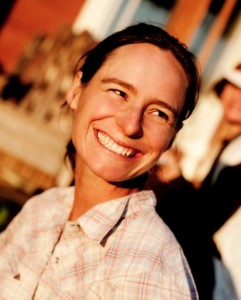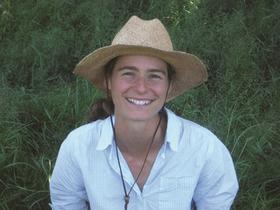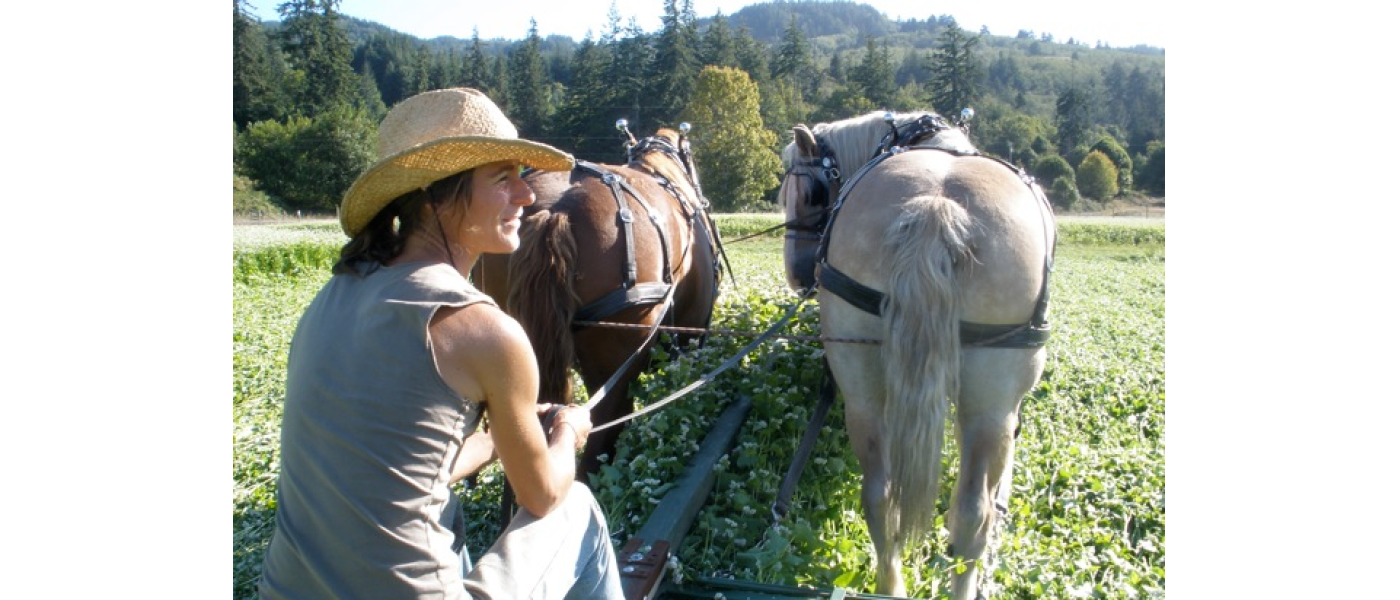Zoë Bradbury and her family operate Valley Flora, an 80-acre produce and vegetable farm on the southern coast of Oregon. After spending two years preparing for a life of farming, Zoë still ran into a long list of challenges that beginning farmers often encounter. With the right resources, she was able to persevere and turn her farm into the thriving, community-oriented destination that it is today.
From the time she was a teenager, Zoë Bradbury was almost positive that she wanted to pursue a career in farming at her home on the southern Oregon coast. With a short drive to the ocean and 80 acres of pasture and woods surrounding her, who would ever want to leave? Zoë went off to Simon’s Rock College of Bard at the age of 16, and then transferred to Stanford University, finding work on small organic farms throughout her time as an undergrad. After graduating, she continued her work on commercial farms, eventually returning to her native home on the southern Oregon coast to start up her own operation.
During her first two start-up years, she served as a national Food and Society Policy Fellow with the Kellogg Foundation. During that time, she worked closely with Friends of Family Farmers, an Oregon based non-profit dedicated to socially responsible agriculture. She helped to develop their online iFarm resource tool, which helps farmers in Oregon find the resources they need to succeed.
 Zoë has also been very connected with the Greenhorns, an organization that is at the forefront of the new farmers movement, empowering a new generation of farmers. She is a co-editor of the new book Greenhorns: 50 Dispatches from the New Farmers Movement, which features 50 essays from beginning farmers about their experiences on the road to becoming farmers.
Zoë has also been very connected with the Greenhorns, an organization that is at the forefront of the new farmers movement, empowering a new generation of farmers. She is a co-editor of the new book Greenhorns: 50 Dispatches from the New Farmers Movement, which features 50 essays from beginning farmers about their experiences on the road to becoming farmers.
From the beginning, Zoë knew that starting a farm would be a challenging process. Not only did she have to jump headfirst into a competitive market, she had to have access to resources for infrastructure, find viable credit for initial farming costs, and had to work hard to make a profit that would help her pay off her debt and grow her farm for the future. As she explains, although you can try to plan around these types of concerns, it is really difficult to foresee every problem that might come your way when starting your own operation.
“Even with two years of planning under my belt, I still felt unprepared for all of things I faced that first year of farming,” she tells me. Zoë had a three-year financial projection plan, as well as $10,000 saved before she ever broke ground on her farm. “It’s daunting. Not just the production aspect, but figuring out how to run the business end of everything too; there is a huge learning curve,” she explains.
For beginning farmers, this learning curve can make or break their first season’s success. “There is almost this shame in not knowing certain things as a beginning farmer” Zoë mentions. “Sometimes I felt embarrassed by the fact that I didn’t know everything all at once – that I had so many questions, and so much to learn.” The majority of these questions had to with different parts that she needed for her irrigation system, or when the right dates to plant certain crops were. Zoë scoured the Internet and newsletters for information, relied on her wonderful network of seasoned farmers and extension agents, and tried to learn as much as possible that first year. She also had to tackle all of the permits and certifications so that she would be able to commercially sell her crops.
After financing the permits, irrigation systems, seeds, equipment and upgrades to her family’s land, Zoë quickly realized that the $10,000 she had saved up wasn’t going to cut it. And after getting rejected for USDA loans and low interest loans from the banks, she had nowhere else to turn for money. Without any resources left, she made the very risky decision to put all of her debt on a 0% interest 1-year credit card, praying that her first season’s yield would be enough to cover all that she owed.
“It’s tough in the first few years, just trying to get a foothold,” she explains. “You really have to claw your way into the business.” Luckily, Zoë was able to make enough her first year to pay off her credit card, and was able to build up a little bit more of a foundation for the second growing season. Now in her fifth year, Zoë says that is has become easier and easier to get by every season. With strong advocacy from farm organizations, including Farm Aid, the USDA is beginning to make access to credit one of its priorities, something that will go a long way in making it possible for new farmers to get on the land.
 Today, Valley Flora has turned into a three-part venture between Zoë, her sister Abby, and her mother Betsy. Zoë manages all of the berries, flowers, asparagus, and other outdoor row crops. Abby carries the title of “Greens Queen,” overseeing salad greens production and the recently added orchards. Betsy manages all of the greenhouses, producing tomatoes, peppers, cucumbers, basil and summer squash. Together Zoë, Abby and Betsy make up a trio of vegetable connoisseurs that provide fresh food for their local community.
Today, Valley Flora has turned into a three-part venture between Zoë, her sister Abby, and her mother Betsy. Zoë manages all of the berries, flowers, asparagus, and other outdoor row crops. Abby carries the title of “Greens Queen,” overseeing salad greens production and the recently added orchards. Betsy manages all of the greenhouses, producing tomatoes, peppers, cucumbers, basil and summer squash. Together Zoë, Abby and Betsy make up a trio of vegetable connoisseurs that provide fresh food for their local community.
Valley Flora has also grown to include a CSA program, a U-pick orchard and berry farm, and a farm stand that accepts Supplemental Nutrition Assistance Program (SNAP) benefits, increasing the food security of the local community. They have added some facility sheds and have been able to expand their acreage consistently every year to increase their production. Although Zoë and her family are finally in a comfortable position financially and with the size of their farm, the road to this point has been very long and winding. Starting up the farm took a lot of resources that Zoë really didn’t have access to or that she didn’t know where to find.
“I often wished that there was one place that I could have gone to get all of the information that I needed, and at that time it didn’t really exist,” she says. She was forced to find a lot of farming information, financial counseling, permit requirements, and general information all on her own.
Transferring information and resources is one of the most crucial aspects of successfully putting a new generation of farmers at the roots of our food system. Here at Farm Aid, we have developed a tool called the Farmer Resource Network (FRN), which enables farmers of all types to access the information, counseling, and funding opportunities they need to thrive. The FRN brings together beginning farmers, experienced farmers and farm organizations that are all working separately for the same goal: To enable current and new farmers to grow a strong family farm centered agricultural system.
As for Zoë, she always remains positive about being a beginning farmer and working through the almost certain adversity farmers face in their lives. “I have come to realize that farmers must just be inherently optimistic, there is so much potentially working against them,” she laughs. And as for new farmers, she encourages them to over plan for everything that might happen before they even start farming. “My friend had a saying that I like to live by: Proper prior planning prevents piss poor performance,” she jokes. “Start by saving, and make sure you have as many things lined up as possible before you start putting seeds in the ground.”
Zoë also found it very important to find a geographic location that was going to give her an edge. “Finding an area where you are going to be able to market your products is crucial, and also trying to do something that might be a little bit different than everyone else,” she explains. Lucky for Zoë, she has found that exact spot in her own community in Oregon.
As new farmers like Zoë enter our country’s farming system, there is an increasing need for guidance, resources, and financing opportunities. Programs like Farm Aid’s Farmer Resource Network, Friends of Family Farmers’ iFarm, and books like Greenhorns aim to help a new generation of family farmers grow and thrive in local and regional food systems. To learn more about Zoë and Valley Flora, check out the video below that we shot of her talking about beginner farming credit, or visit her farm website.
Further Reading
- Check out our Beginning Farmers guide, part of the Farmer Resource Network, for information and links for anyone to explore as they consider becoming a farmer.
- Read more about the Farmer Resource Network in our Ask Farm Aid column answering a reader question about getting into farming.



